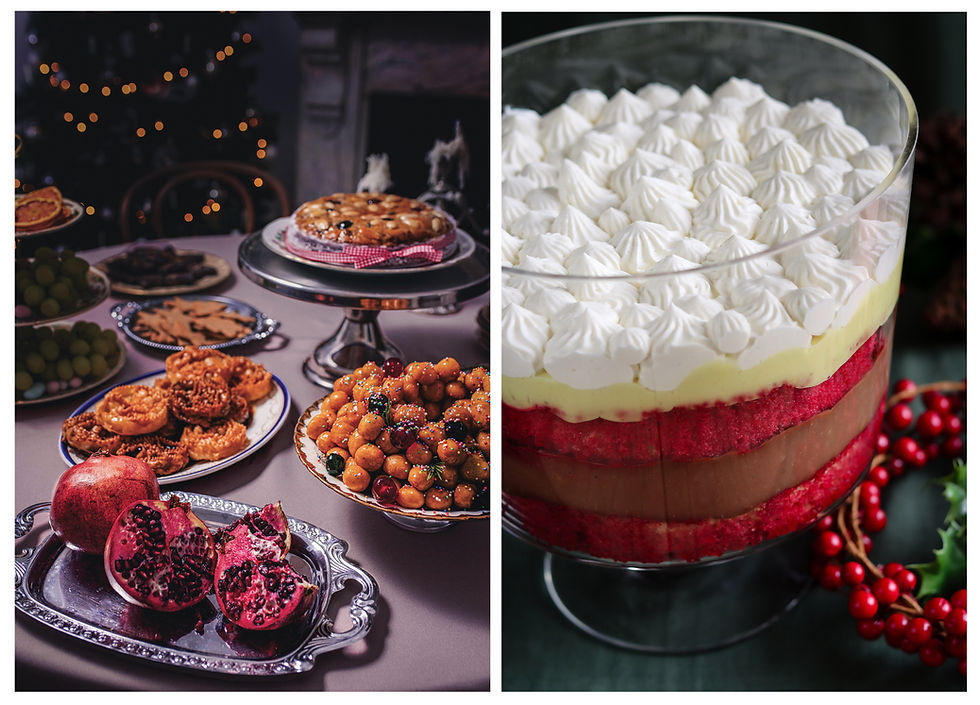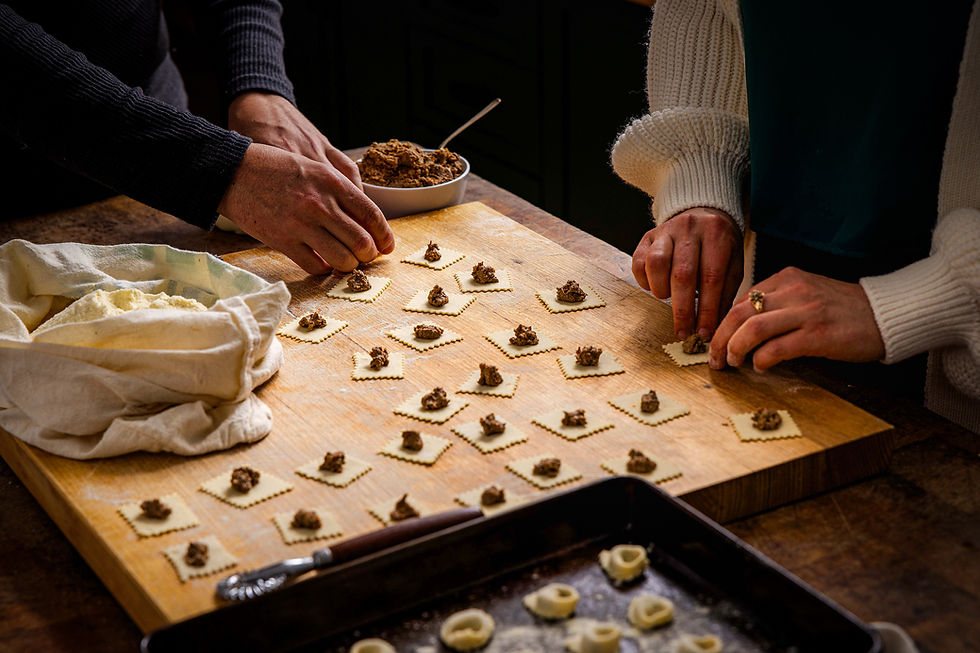We are what we eat
- Nadia Fragnito

- Feb 24, 2019
- 4 min read
Updated: May 28, 2022
The act of eating isn't just a functional transaction. It goes deeper. Much deeper. Here's what I've learned about emotional eating.

Sometimes I feel like I’m a genteel nineteenth century lady, sipping on sweet piping hot tea and nibbling on delicacies from vintage china. Other times I want to pull on my tracksuit pants, my floppiest jumper (the one with stains on it) and dig into a big bowl of spaghetti.
We are what we eat.
If this is true, then who are we at any given meal?
I see who I am in the ritual of tea making. As I prepare the pot, washing it out with hot water then allowing the loose-leaf tea to steep. I wait. In these moments I am patient. I am ceremonial.

Other times I want to disregard this refined lady and embrace the slovenly with a TV dinner. I like to cradle a dangerously full bowl of pasta in my lap in the dim light of the flickering screen. At these times I want to escape, to forget and absorb myself in the pleasure of the moment. I am comfort. I am indulgence.

There is so much more going on here than consuming food for sustenance. It also reflects what we are feeling. We are more intrinsically linked to food and drink than we realise.
Before we got together, my husband used to have plain porridge for lunch every day at work. When I first heard this, I struggled to understand why he would subject himself to the same lacklustre meal every day. And not just any food. It wasn’t the glamorous porridge you see on Instagram today. No Jackson Pollock drizzles of peanut butter, melted chocolate and cacao nibs with slices of out of season tropical fruit. Just plain old microwaved oats. I shudder at the thought. Do you too? Or do you understand him more than I? He explained to me that he chose porridge because it was easy, quick, cheap and filling. He wasn’t looking for joy in his meal. He wanted practical, no-nonsense food so he could focus on more important things. This is my husband to a T. You really are what you eat. However, now that we are married, I would never let him get away with such a banal lunch!
On the other hand, sometimes the food we eat reflects what we are emotionally lacking. Years ago I used to sneak and eat sweets after my boyfriend went to bed. Sometimes when there was no quick-fix chocolate in the house, I’d whip up strange sickly sweet concoctions to satisfy the craving. There was no stopping my addiction. Then, after we broke up, I continued this trend. Often after dinner, late at night, I would walk alone in the dark to the nearest store that was 20 minutes away. Here I was, a young woman walking alone in the dark just to satisfy a craving. Was I crazy? No, I was just really unhappy. And lonely. So what did I really crave? Sweet, rich ingredients to make me feel what I didn’t have - happiness. With one bite, serotonin and phenylethylamine rushed through my body. They were my hit, my love drug.

Fortunately, I’m not depressed anymore. And I don’t go around like a thief in the night looking to loot all the sweets. But it makes you think. There is an undeniable connection to where we’re at in life and the food we eat. Admittedly, I lapsed my once steadfast vegan diet when I was at my emotional lowest. That’s another story, for another day. Let’s just say my self-love had gone missing, somewhere along with my self-worth. So I took to dairy like a baby suckling its mother’s breast. On my bad days I scoffed cheese, ice cream, S&W Whole Egg Mayo – whatever made me feel pleasure. Guilty pleasure. I was too busy feeding my sad little heart to consider what I was consuming had its own trail of sadness.

Not surprisingly, cheese and dairy is addictive. Milk contains a special protein called casomorphin, which works like an opioid, a drug that makes you feel euphoric and gives you withdrawals when you try to go off it. Interestingly, the casomorphins in milk exist solely for the baby animal to bond with its mother. Let’s say Mooey, a male calf, isn’t drinking his mamma’s milk. Nature devised this wonderful way to make him come back for more through the special addictive casomorphin protein in the milk. So Mooey can now grow big and strong from all the nutrients Mamma is feeding him. This same process happens in human infants. So it’s no surprise that when adult humans consume dairy, we want to come back for more. And cheese, now that’s the biggest drug. It’s more concentrated than milk so your opioid hit is off the charts.
I don’t use this personal experience as an excuse. But rather an example of how the food we consume reflects our state of mind, a stage in our lives. It bookmarks our journey, the way we were, who we become. It highlights our upbringing, our health, our holidays, our work life, our country of origin, our family, our relationships, our break ups. Our lows. Our highs. Just ask anyone what their fondest food memory is. Food is such a powerful sensory tool, full of meaning, full of story.

Right now my life is dominated by Italian food, it’s a way of holding onto a piece of my heritage, of my heart.
Food is so much more than an ingestion transaction. Next time you take that bite, pay attention. It could tell you a whole lot more than your caloric intake.
It’s food for thought.




Comments